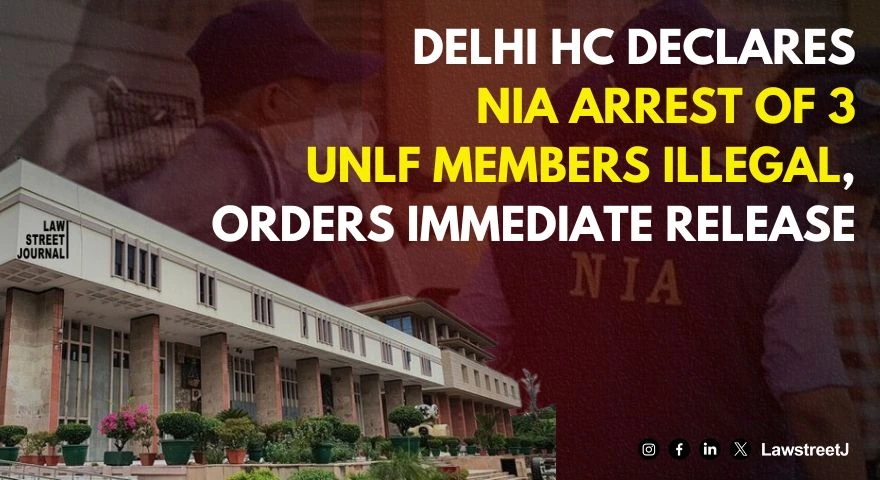NEW DELHI: The Delhi High Court has on February 20 ordered release of three alleged members of designated terrorist organisation the United National Liberation Front (UNLF) engaged in insurgency in Manipur, after declaring their arrest as illegal and vitiated for not having served them the grounds of arrest in writing.
Delhi High Court Quashes NIA Arrests of UNLF Members, Citing Constitutional Violation
A bench of Justice Anup Jairam Bhambhani found arrest of Thokchom Shyamjai Singh, Laimayum Anand Sharma, and Ibomcha Meite on March 13, 2014 as vitiated and they were directed to be released from judicial custody forthwith unless required in any other case.
In light of the verdicts of the Supreme Court in Pankaj Bansal, Prabir Purkayastha, and Vihaan Kumar, which are founded on Article 22(1) of the Constitution of India, the court said, "There remains no doubt that the requirement of serving grounds of arrest in writing to an arrestee is compulsory and unquestionable regardless of whether an arrest has been made under the PMLA or the UAPA or under any other criminal statute."
Supreme Court Rulings Impact UAPA Cases: Delhi HC Orders Release of Three UNLF Members
Moreover, the burden to prove compliance with the requirements of Article 22(1) of the Constitution always rests with the Investigating Agency, it said.
Thokchom Shyamjai Singh and others led by their counsel Siddhartha Borgohain challenged their arrest by the National Investigation Agency on March 13, 2024 in the FIR lodged on July 19, 2023 under Sections 120-B/121-A/122 of the IPC and Sections 18/18-B/39 of the UAPA at New Delhi.
The court here examined the question whether the constitutional mandate of serving grounds of arrest in writing to an arrestee under the Unlawful Activities (Prevention) Act, 1967 comes into effect from the date of the Supreme Court judgment in Pankaj Bansal Vs Union of India & Ors (2024) or in Prabir Purkayastha Vs State (NCT of Delhi) (2024).
In its order, the court found, the record shows that no transit remand or other order of a court was obtained by the NIA before bringing the petitioners to Delhi after taking them into custody in Imphal, Manipur.
Therefore, it would appear that no legal representation was afforded to the petitioners at that stage, it noted.
"The arrest of all 03 petitioners on 13.03.2024 is accordingly vitiated and is hereby set-aside. Consequently, remand order dated 14.03.2024 and all subsequent remand orders passed by the learned Special Court are also quashed," the court said.
Pertinently, the court said, in Pankaj Bansal and Prabir Purkayastha the arrest was held to be illegal and was quashed; and the arrestee was directed to be released from custody (in the case of Prabir Purkayastha, by directing the arrestee to furnish a bail bond).
"If there was to remain any doubt about the about the sacrosanctity attached to furnishing the grounds of arrest in writing to an arrestee, in its recent 2025 judgment in Vihaan Kumar Vs State of Haryana & Anr, the Supreme Court has minced no words in holding that the requirement of informing a person arrested of grounds of arrest is a mandatory requirement of Article 22(1) of the Constitution," the bench said.
The court pointed out that the law in relation to arrests (in the context of the PMLA) declared by the Supreme Court in Pankaj Bansal was held by them to specifically apply "henceforth," meaning thereby that the interpretation of the law in that case was to be applied prospectively.
But, it said, in Prabir Purkayastha the Supreme Court has made no such observation in relation to arrests under the UAPA and other criminal offences.
"As a result, the ratio of Pankaj Bansal would apply to arrests under the UAPA and other criminal offences from the date of pronouncement of Pankaj Bansal (i.e., 03.10.2023) and not from the date of Prabir Purkayastha (i.e. 15.05.2024)," the bench said.
The NIA lamented that they could not have complied with such requirement in relation to an arrest made under the UAPA before the decision was rendered in Prabir Purkayastha.
The court said, this contention raised by the NIA cannot be accepted, since that it was answered in Prabir Purkayastha. Therefore, there cannot be any two views, that the mandate of Pankaj Bansal would apply to the arrest of the petitioners in the present case, even though they were arrested on March 13, 2024.
"It must be observed that as per the well settled constitutional canon of interpretation, unless the Supreme Court specifically indicates that a decision it renders will operate prospectively, the law declared by the Supreme Court is presumed to have been the law at all times," the court said.
The petitioners claimed their arrests were made in contravention of the requirements of Section 50 of the Code of Criminal Procedure, 1973, read with Section 43-B of the UAPA. They contended since they were not served with the grounds of arrest in writing, as mandated by the interpretation of the statutory provisions in line with Article 22(1) of the Constitution, their arrest was illegal and unconstitutional, and deserved to be set-aside.
The NIA claimed the petitioners were Chief of Army of the United National Liberation Front (UNLF), a designated terrorist organisation; petitioner no 2 is the Chief of Intelligence of the UNLF; and petitioner no 3 is an active member of the UNLF. It claimed the petitioners are part of a trans-national conspiracy hatched by Myanmar-based terror outfits, to exploit the ethnic unrest in the State of Manipur and to wage war against the Government of India.
The petitioner were initially arrested at Bir Tikendrajit International Airport, Imphal, Manipur.
The NIA contended since the petitioners were arrested on March 13, 2024, there was no legal requirement for the NIA to have served upon the petitioners the grounds of arrest in writing; but that in any event, at the time of their arrest the grounds of arrest were explained to the petitioners orally; and that later the grounds of arrest were served upon the petitioners in writing as part of the remand applications.
The court ordered the release of three petitioners on serving a personal bond of Rs 50,000 and two sureties of the like amount.







![Delhi High Court Sets Aside Arbitral Tribunal's Award Against NHAI in Highway Project Delay Case [Read Judgment]](/secure/uploads/2023/07/lj_9605_23374c2e-392c-4491-a2fe-f2f12fc5272f.jpg)
![Delhi Court Rejects Stay Request in Defamation Case Against Rajasthan CM Ashok Gehlot [Read Order]](/secure/uploads/2023/08/lj_5208_80de1ddc-d76a-4f7f-b180-408e3ae14fb4.jpg)





